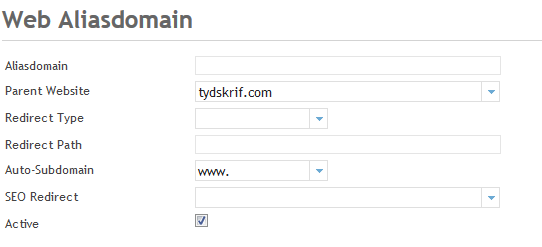Difference between revisions of "Adding an aliasdomain"
Your guide to pathway services
| Line 27: | Line 27: | ||
#In the '''Redirect Path '''field, enter the redirect path. The redirect path is the route taken to reach a destination. This is the path (full path or path relative to the document root) or URL where the redirect should point to. (Also known as the ‘target’ path). | #In the '''Redirect Path '''field, enter the redirect path. The redirect path is the route taken to reach a destination. This is the path (full path or path relative to the document root) or URL where the redirect should point to. (Also known as the ‘target’ path). | ||
#The '''Auto-Subdomain''' field is enabled by default and is pointed to ''www.'' , if you would like to disable this feature make a selection from the dropdown list. | #The '''Auto-Subdomain''' field is enabled by default and is pointed to ''www.'' , if you would like to disable this feature make a selection from the dropdown list. | ||
| − | #From the '''SEO Redirect''' dropdown list, make a selection. This field | + | #From the '''SEO Redirect''' dropdown list, make a selection. This field allows you to do redirects for SEO optimization. (Refer to previous sections for more information on redirects.) |
#Select the '''Active '''checkbox to activate the aliasdomain. To deactivate the aliasdomain unselect the checkbox. | #Select the '''Active '''checkbox to activate the aliasdomain. To deactivate the aliasdomain unselect the checkbox. | ||
Revision as of 13:17, 3 February 2014
Alias domains are domain names that point to the same website. You can create an alias domain like examples.com that points to the website example.com. Both sites we be exactly identical and will show the same content.
To get to the Aliasdomain page:
- Click on the Sites tab.
- From the sidebar locate the Websites section.
- Select Aliasdomain for website.
To create a new aliasdomain:
- Click on Add new Aliasdomain.
- In the Aliasdomain field, enter the name of the alias domain. (For example, if you want examples.com to point to the same website as example.com, enter examples.com in the Aliasdomain field.)
- From the Parent Website dropdown list, select the parent website that you would like your alias domain to point to. (For example, If example.com is the parent website, examples.com will point to example.com.)
- From the Redirect Type dropdown list, make a selection. This field allows you to disable or enable redirect. It also allows you to select the redirect flag. (Refer to previous sections for more information on redirects.)
- In the Redirect Path field, enter the redirect path. The redirect path is the route taken to reach a destination. This is the path (full path or path relative to the document root) or URL where the redirect should point to. (Also known as the ‘target’ path).
- The Auto-Subdomain field is enabled by default and is pointed to www. , if you would like to disable this feature make a selection from the dropdown list.
- From the SEO Redirect dropdown list, make a selection. This field allows you to do redirects for SEO optimization. (Refer to previous sections for more information on redirects.)
- Select the Active checkbox to activate the aliasdomain. To deactivate the aliasdomain unselect the checkbox.





